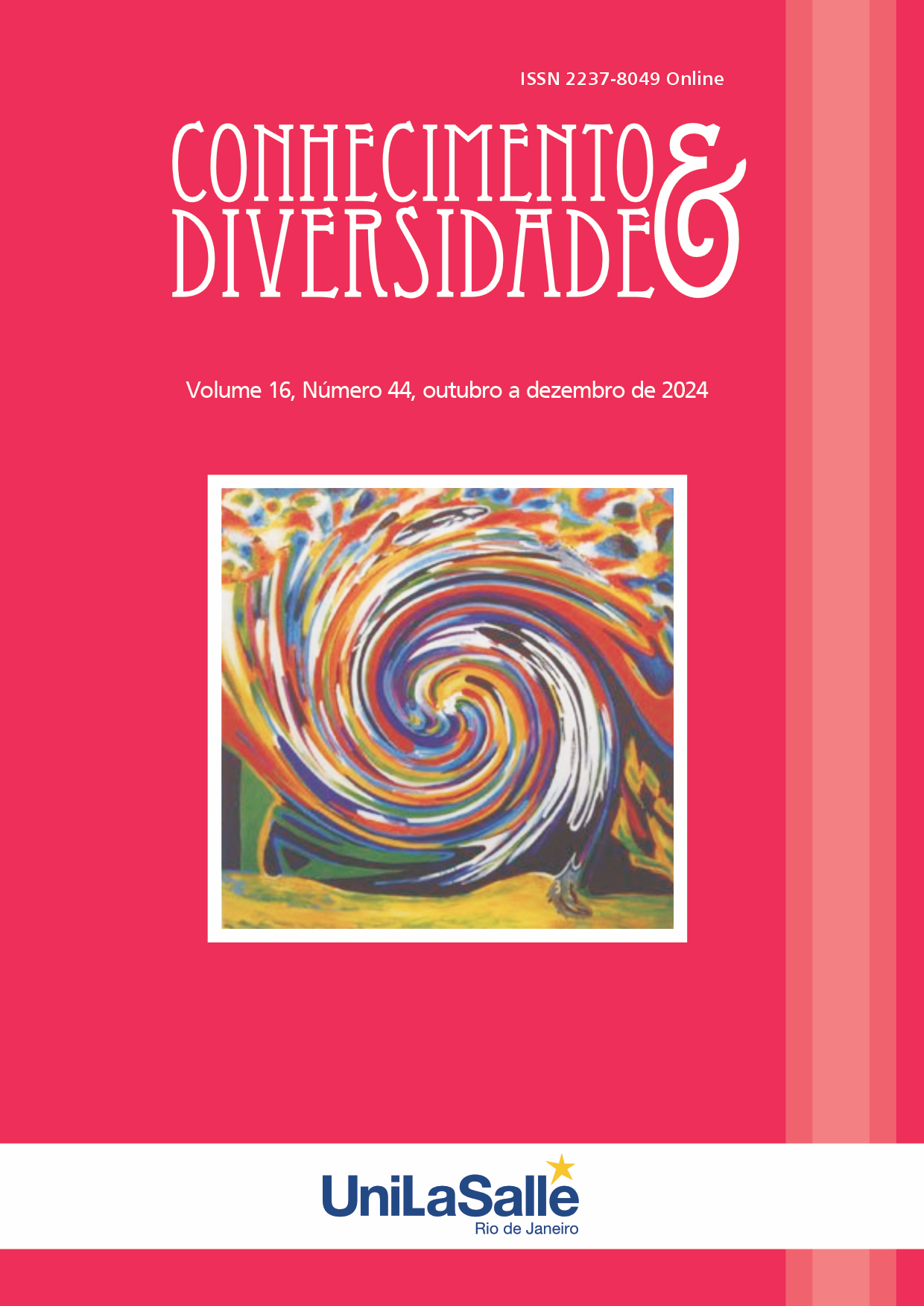FOREİGN STUDENTS' OPİNİONS ON TURKİSH LESSONS STRUCTURED WİTH CREATİVE DRAMA METHOD İN MUSEUM
DOI:
https://doi.org/10.18316/rcd.v16i44.12294Palabras clave:
Turkish as a Foreign Language, Erasmus student exchange program, Museum Education, Creative Drama, Turkish EducationResumen
Qualitative research approach was adopted in this study, which was carried out in order to determine the views of higher education students within the scope of the Erasmus exchange program on Turkish learning comparatively according to the teaching method. The research data were collected through semi-structured interviews from 20 Erasmus exchange program students studying at a state university in the fall semester of the 2023-2024 academic year, which was determined through criterion sampling, one of the purposive sampling methods, and descriptive analysis technique was used to analyze the data. As a result of the research, it is clearly seen that the courses carried out by the exchange program students through creative drama in the museum contribute to the Turkish learning process, cultural awareness and comparisons with previous courses. Student views support the role of creative drama methods in improving language skills, acquiring cultural knowledge, and making the learning process more effective and enjoyable. In addition to supporting the language learning process, creative drama methods also play an important role in increasing cultural awareness and knowledge. These findings show that creative drama methods can be used as a powerful and effective tool in language education and cultural learning processes in the museum.
Citas
Addis, M., de Stefano, I., & Guerrisi, V. (2023). Cultural Mediation for Museums. Driving Audience Engagement, Routledge, New York, NY.
Aronsson, B. (2023). Language learning activities in the Spanish L2 classroom related to a task-based framework: What types are the most commonly occurring according to Swedish learners? Language Teaching Research, 1-27. https://doi.org/10.1177/13621688221144282
Bailey, K. M., & Nunan, D. (Eds.). (2023). Research on English language teaching and learning in the Middle East and North Africa. Routledge. https://doi.org/10.4324/9781003312444
Batiste, N. M. (2022). Museum Curriculum: Exploring Museums via Eisner’s Educational Connoisseurship and Critical Analysis (Doctoral dissertation, Texas A&M University-Commerce).
Black, G. (2021). Engaging Museum Audiences: Strategies for Learning and Communication. Routledge.
Brumfit, C. (1987). Applied linguistics and communicative language teaching. Annual Review of Applied Linguistics, 8, 3-13.
Çelik, M. E. (2018). Türkçenin Yabancı Dil Olarak Öğretiminde Otantiklik ve Otantik Materyallerden Yararlanma. 21. Yüzyılda Eğitim ve Toplum, 7(21), 791-806.
Deci, E. L., & Ryan, R. M. (2000). Intrinsic Motivation and Self-Determination in Human Behavior. Springer.
Dewey, J. (1986). Experience and education. In The educational forum (50(3), 241-252). Taylor & Francis Group.
Dierking, L. D., & Falk, J. H. (2019). Learning from Museums: Visitor Experiences and the Making of Meaning. Rowman & Littlefield.
Dodson, S. (2002). The educational potential of drama for ESL. In G. (Ed.), Body and language: Intercultural learning through drama (161–180). Westport, CT: Ablex.
Dorn, L., & Jones, T. (2023). Apprenticeship in literacy: Transitions across reading and writing, k-4. Routledge. https://doi.org/10.4324/9781032680569
Ellis, N. C. (2023). Bilingual language cognition as a complex adaptive system. Bilingualism: Language and Cognition, 26(1), 31-32. https://doi.org/10.1017/S1366728922000372
Falk, J. H., & Dierking, L. D. (2018). Museum Learning: Theory and Research as Tools for Enhancing Practice. Routledge. https://doi.org/10.4324/9781315696447
Gardner, H. (2021). The Disciplined Mind: Beyond Facts and Standardized Tests. Penguin Books.
Güngör, B., & Önder, A. (2023). Development of English picture vocabulary test as an assessment tool for very young EFL learners’ receptive and expressive language skills. Early Education and Development, 34(2), 572-589. https://doi.org/10.1080/10409289.2022.2043134
Harmer, J. (2015). The practice of English language teaching. Pearson.
Hooper-Greenhill, E. (2018). Museums and Education: Purpose, Pedagogy, Performance. Routledge.
Kaufman, K., & Kaufman, P. (2024). Warhol Speaks: How One Museum Leverages Communications Strategies to Engage in an Era of Innovation and Value Creation. Atlantic Marketing Journal, 13(2), 13.
Kolb, D. A. (1984). Experiential learning: Experience as the source of learning and development. Prentice-Hall.
Kramsch, C. (2013). Language and Culture. Oxford University Press.
Krashen, S. (1985). The Input Hypothesis: Issues and Implicatons. New York: Longman.
Lighthill, B. (2022). Integrated Education. In: Rezaei, N. (eds) Integrated Education and Learning. Integrated Science,13, 51-71. Springer. https://doi.org/10.1007/978-3-031-15963-3_4
Luo, S., Ismail, L., binti Ahmad, N. K., & Guo, Q. (2024). Using process drama in EFL education: A systematic literature review. Heliyon, 10(11). https://doi.org/10.1016/j.heliyon.2024.e31936
Maley, A., & Duff, A. (2001). Drama techniques in language learning: A resource book of communication activities for language teachers. Cambridge University Press.
Mayer, R. E. (2014). ‐Based Principles for Designing Multimedia Instruction. Copyright and Other Legal Notices, 59.
McCaslin N. (1996). Creative drama in the classroom and beyond (6th ed.). White Plains, NY: Longman.
Miles, M. B. & Huberman, A. M. (1994). Qualitative data analysis: An expanded sourcebook. Sage.
Öz, K., Ahiskali, E. E., & Türkel, A. (2022). Is an Online Creative Drama Lesson Possible? Preschool Prospective Teachers' Opinions on the Effectiveness of Online Creative Drama Lessons. International Journal of Education and Literacy Studies, 10(3), 121-128. http://dx.doi.org/10.7575/aiac.ijels.v.10n.3p.121
Richards, J. C., Panahi, A., & Mohebbi, H. (2023). Language Teaching Research Quarterly. Language Teaching Research, 33, 4-67. doi:10.32038/ltrq.2023.33.02
San, İ. (2021). Yaratıcı drama ve müze. Yeni İnsan Yayınevi.
Tsang, A., Paran, A., & Lau, W. W. (2023). The language and non-language benefits of literature in foreign language education: An exploratory study of learners’ views. Language Teaching Research, 27(5), 1120-1141. doi.org/10.1177/136216882097234
Türkel, A. (2012). Dinleme eğitimine ilişkin teknikler ve değerlendirmeleri. Dokuz Eylül Üniversitesi Buca Eğitim Fakültesi Dergisi, (34), 128-141.
Yıldırım, A. ve Şimşek, H. (2005). Sosyal Bilimlerde Nitel Araştırma Yöntemleri (5. Baskı). Ankara: Seçkin Yayıncılık.
Descargas
Publicado
Número
Sección
Licencia
Derechos de autor 2024 Koray Öz

Esta obra está bajo una licencia internacional Creative Commons Atribución 4.0.
Tal como recomienda el Public Knowledge Project, RCD adopta para sus artículos una licencia CREATIVE COMMONS: Attribution CC BY 4.0
Esta licencia permite que otros distribuyan, remezclen, adapten y desarrollen su obra, incluso con fines comerciales, siempre que le atribuyan a usted el mérito de la creación original.
Esta es la licencia más adecuada que se ofrece.
Recomendado para la máxima difusión y utilización de los materiales bajo licencia.



